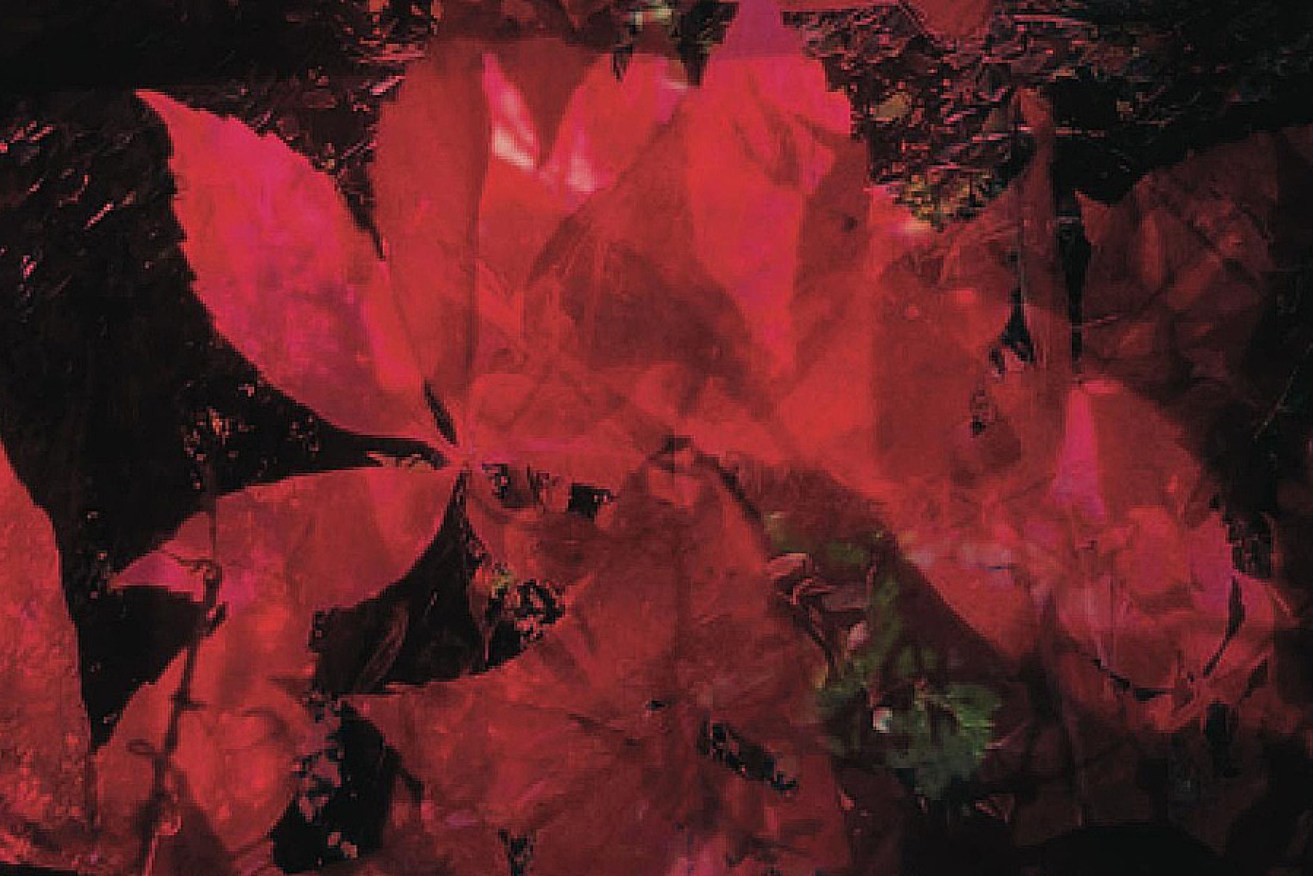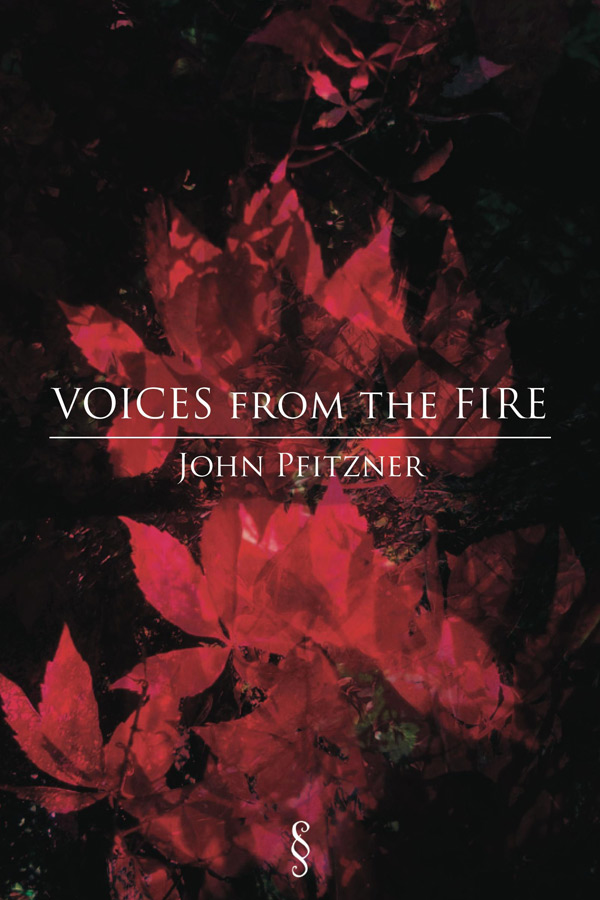John Pfitzner: Voices From The Fire

Cover detail from Voices From the Fire, published by Friendly Street Poets.
Voices From the Fire, a posthumous collection of poems by John Pfitzner, will be launched tomorrow in Adelaide. Here, Poet’s Corner editor John Miles pays tribute to Pfitzner and shares some of his verse.
The stereotype of a poet composing away in a garret in isolation would be put to rest in more ways than one by John Pfitzner. League footballer and long-distance runner, editor and illustrator, classical scholar and pastor – as well as poet – Pfitzner was fully of the world and people.
Born John Clement Pfitzner in 1942 in Loxton, he studied English literature and classical Greek at Adelaide University, and theological studies at Immanuel Seminary. In those years, he was also a footballer for University, Tanunda, and West Adelaide in the SANFL.
Ordained a Lutheran minister, he served his first pastorship in Murray Bridge, followed by 15 years at historic Hermannsburg Mission. At Hermannsburg, as well as becoming a long-distance runner against a MacDonnell Ranges backdrop, he learnt the Arrernte language of his flock, a lingua franca of the mission from its founding to this day.
John’s poetry, strongly lyrical and narrative, is also possessed of true irony. His poem Being Mobile displays all three and reveals a cornerstone of his life.
Some dig in, not venturing
out of the trenches,
staying put.
I prefer to be mobile,
keeping on the move,
not getting bogged down.
I travel light,
leaving room in my bag
for acquisitions along the way.
I discard non-essentials:
dogmas that have seen better days,
truths that have outgrown their usefulness.
Rigid schedules are not for me.
Leave me free to detour,
change direction.
When it’s time to move on,
I want to be ready to throw
my swag in the back of the ute.
Returning to Adelaide, he undertook another seven years of pastorship, followed by a role at publishing house Openbook, membership of the Society of Editors and Amnesty International, and chairmanship at state and federal level of the Bible Society. He also had roles with the Lutheran Bible Translators, during which time two major editions were seen, one in New Guinean Bukawa, the other in the creole language of the Northern Territory.
The word retirement was non-existent for John, who also joined the Friendly Street poetry group. There he continued apace with prolific output, some of which attracted national awards. After being mentored there himself, he gave back with his own mentoring editorship.
His death in his sleep at the beginning of this year, aged 70, came as a shock to all who knew John, his wife Diana, their three children and three grandchildren, and a wide circle of extended family, friends and peers.
 Voices From the Fire (published by Friendly Street Poets, $20) is a collection wide in its reach and personal feeling. True lyric poets master such a combination. Poems range from those of family, wartime and Holocaust Europe, to South Australian German heritage, Aussie sport and the outback, and John’s Hermannsburg years. A collection of fine pencil art by the author is also to be found throughout the book.
Voices From the Fire (published by Friendly Street Poets, $20) is a collection wide in its reach and personal feeling. True lyric poets master such a combination. Poems range from those of family, wartime and Holocaust Europe, to South Australian German heritage, Aussie sport and the outback, and John’s Hermannsburg years. A collection of fine pencil art by the author is also to be found throughout the book.
Posthumous first full collections are rare. The depth of this one would lead readers to hope that there will be another from the legacy of work the author is said to have left behind.
Voices From the Fire will be launched tomorrow (December 12) at the Effective Living Centre, 26 King William Road, Wayville at 7.30pm. Two more of John’s poems can be found below. They were hard to choose.
Pointless
for Graham, who is mad on sport but sees no use for poetry
You’re right, there’s no point
to poetry. It’s as useless
as a Michael Clarke cover drive
with dancing foot work,
body balanced, head steady,
weight gliding to the front foot,
the almost lazy sweep of the bat,
the perfect timing and rhythm,
the flow of the follow-through,
the seemingly effortless elegance,
which changes nothing, adds nothing
to the sum of human knowledge,
rights no wrongs, cures no diseases,
provides no food for the starving,
as pointless as a poem
with language that dances down the pitch,
gives itself room and launches
its outrageous idea, its subtle
observation high over midwicket
and into the members stand
with perfect timing, rhythm and
seemingly effortless eloquence.
A modest god
At the Grand Canyon,
souvenir plaques
extol god’s creation
and invite us to marvel
at the work of his hands.
Next day, down from
the heights, in the
broken-down country
left to the Indians, I ask,
‘Isn’t this god’s creation too?’
Don’t sell me a god
of grand gestures,
an attention seeker
craving recognition,
showing off to tourists.
Give me a modest god
of subtle artistry,
hidden in the hard country,
ready to rough it
with the rest of us.
Readers’ original and unpublished poems up to 30 lines can be emailed, with postal address, to [email protected]. A poetry book will be awarded to each contributor.




